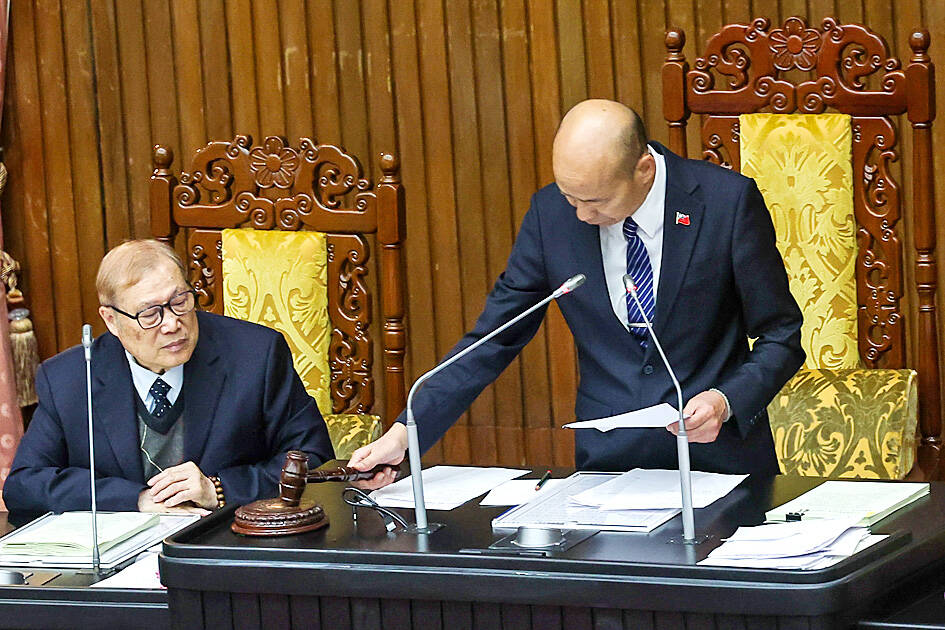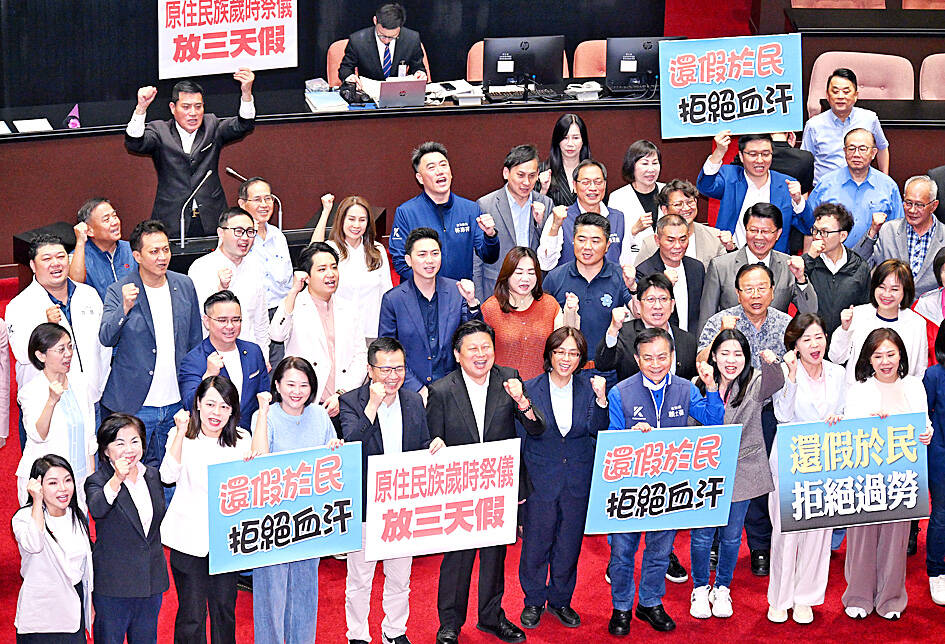The Legislative Yuan yesterday passed new legislation adding four national holidays and making Workers’ Day a national holiday for all sectors.
The Chinese Nationalist Party (KMT) and the Taiwan People’s Party used their combined majority in the legislature to push the jointly proposed draft through its third and final reading.
This new law supersedes the existing regulations for the implementation of memorial days and state holidays, which are administered by the Ministry of the Interior.

Photo: CNA
The new law recognizes Confucius’ birthday on Sept. 28, the anniversary of the Battle of Guningtou on Oct. 25, Constitution Day on Dec. 25 and “Little New Year,” the day before Lunar New Year’s Eve, as national holidays.
With the inclusion of Little New Year, the Lunar New Year holiday now spans five national days off, extending the total break to seven to 10 days depending on where weekends fall. Other official holidays include Children’s Day, Tomb Sweeping Day, Dragon Boat Festival, Teacher’s Day and the Mid-Autumn Festival.
The legislation also changes the current one-day holiday for annual indigenous ceremonies to a three-day holiday chosen by indigenous people based on their traditions.

Photo: Fang Pin-chao, Taipei Times
According to the amendment, the legislation would take effect upon promulgation by the president, meaning three additional national holidays would be observed in the second half of this year on Sept. 28, Oct. 25 and Dec. 25.
The amendment also stipulates that if a national holiday falls on a regular day off, a make-up day off must be provided.
KMT Legislator Niu Hsu-ting (牛煦庭) said that the new national holidays would give workers more leisure time to spend with their families and decrease stress.
Adding more holidays also benefits the service industry and domestic tourism, as workers would spend more on days off, stimulating the economy, Niu said.
Democratic Progressive Party Legislator Su Chiao-hui (蘇巧慧) said that national holidays reflect a nation’s history and values, and are subject to change depending on the majority public opinion.
As such, adding national holidays requires more discussion and public consensus, Su said, accusing the opposition parties of hastily passing the amendment.
The Ministry of the Interior yesterday expressed regret that Direct Election Day on March 23, symbolizing the end of autocratic rule, White Terror Memorial Day on May 19, which highlights transitional justice, and Marriage Rights Equality Day on May 24 were not included in the third reading of the draft act.
Meanwhile, several business groups yesterday called on the government to come up with measures that will help offset the impact of four new national holidays on their operations
In a statement, the Taipei-based Chinese National Association of Industry and Commerce said it understood the public’s right to a work-life balance, but the increased number of holidays could pose challenges for domestic industries.
This was especially true for the manufacturing and service sectors, as well as numerous small-to-medium-sized businesses that rely on employees working in shifts and are under constant pressure to fill orders, it said.
The additional holidays, it said, could increase the operating costs of their businesses as they would need to pay higher overtime wages or adjust workforce duties, hurting their cost structures.
This is especially concerning amid global economic uncertainty as the additional financial burden could undermine these companies’ competitiveness, it added.
The association therefore called on government agencies to provide necessary supporting measures to help businesses adapt to the changes, including offering tax incentives or subsidy programs to offset rising labor costs, and enhancing support for industrial transformation.
Lin Por-fong (林伯豐), the chairman of the Third Wednesday Association, an organization formed by Taiwanese business owners and leaders, echoed the Chinese National Association of Industry and Commerce’s views, saying the “operating costs for businesses will inevitably increase” due to the additional holidays.
With the “reciprocal tariffs” imposed by the United States, the appreciation of the New Taiwan dollar, and weak global consumer demand, domestic businesses could face significant losses this year, Lin cautioned.
He urged the government to provide measures to reduce the burden on local businesses, including lowering the duties on goods imported into Taiwan, in particular tariffs on raw materials.
In contrast to those business groups, tourism operators yesterday lauded the additional holidays, expecting that it could boost domestic and international travel demand, which would help grow the overall market and generate positive effects for the tourism industry.

CHAOS: Iranians took to the streets playing celebratory music after reports of Khamenei’s death on Saturday, while mourners also gathered in Tehran yesterday Iranian Supreme Leader Ayatollah Ali Khamenei was killed in a major attack on Iran launched by Israel and the US, throwing the future of the Islamic republic into doubt and raising the risk of regional instability. Iranian state television and the state-run IRNA news agency announced the 86-year-old’s death early yesterday. US President Donald Trump said it gave Iranians their “greatest chance” to “take back” their country. The announcements came after a joint US and Israeli aerial bombardment that targeted Iranian military and governmental sites. Trump said the “heavy and pinpoint bombing” would continue through the week or as long

TRUST: The KMT said it respected the US’ timing and considerations, and hoped it would continue to honor its commitments to helping Taiwan bolster its defenses and deterrence US President Donald Trump is delaying a multibillion-dollar arms sale to Taiwan to ensure his visit to Beijing is successful, a New York Times report said. The weapons sales package has stalled in the US Department of State, the report said, citing US officials it did not identify. The White House has told agencies not to push forward ahead of Trump’s meeting with Chinese President Xi Jinping (習近平), it said. The two last month held a phone call to discuss trade and geopolitical flashpoints ahead of the summit. Xi raised the Taiwan issue and urged the US to handle arms sales to

BIG SPENDERS: Foreign investors bought the most Taiwan equities since 2005, signaling confidence that an AI boom would continue to benefit chipmakers Taiwan Semiconductor Manufacturing Co’s (TSMC, 台積電) market capitalization swelled to US$2 trillion for the first time following a 4.25 percent rally in its American depositary receipts (ADR) overnight, putting the world’s biggest contract chipmaker sixth on the list of the world’s biggest companies by market capitalization, just behind Amazon.com Inc. The site CompaniesMarketcap.com ranked TSMC ahead of Saudi Aramco and Meta Platforms Inc. The Taiwanese company’s ADRs on Tuesday surged to US$385.75 on the New York Stock Exchange, as strong demand for artificial intelligence (AI) applications led to chip supply constraints and boost revenue growth to record-breaking levels. Each TSMC ADR represents

Pro-democracy media tycoon Jimmy Lai’s (黎智英) fraud conviction and prison sentence were yesterday overturned by a Hong Kong court, in a surprise legal decision that comes soon after Lai was jailed for 20 years on a separate national security charge. Judges Jeremy Poon (潘兆初), Anthea Pang (彭寶琴) and Derek Pang (彭偉昌) said in the judgement that they allowed the appeal from Lai, and another defendant in the case, to proceed, as a lower court judge had “erred.” “The Court of Appeal gave them leave to appeal against their conviction, allowed their appeals, quashed the convictions and set aside the sentences,” the judges